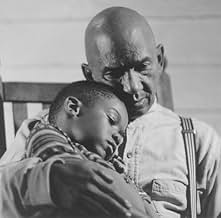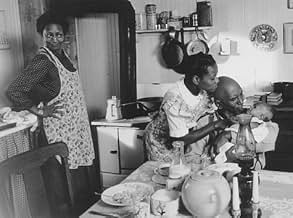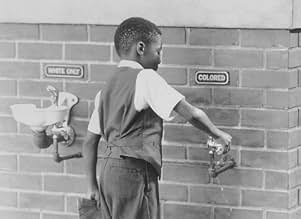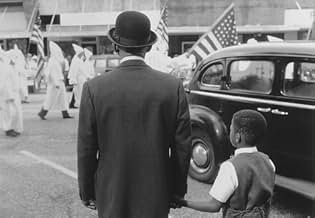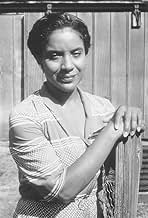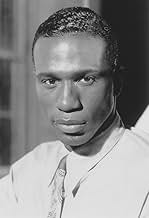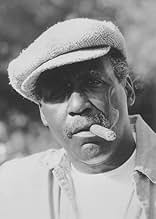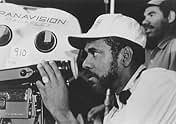A narrator tells the story of his childhood years in a tightly knit Afro-American community in the deep south under racial segregation.A narrator tells the story of his childhood years in a tightly knit Afro-American community in the deep south under racial segregation.A narrator tells the story of his childhood years in a tightly knit Afro-American community in the deep south under racial segregation.
- Awards
- 3 wins & 2 nominations total
Salli Richardson-Whitfield
- Miss Alice
- (as Salli Richardson)
Ray J
- Cliff (12 Yrs.)
- (as Willis Norwood Jr.)
Frank Hoyt Taylor
- Straw Boss
- (as Frank Taylor)
- Director
- Writers
- All cast & crew
- Production, box office & more at IMDbPro
Featured reviews
I kept waiting for the bad moments to happen, as so often they do in these reminiscent movies of growing up in the south, yet no real drama occurred. These were moments pieced together, and if that was the intent--it worked. True, a child's reflection of childhood would be pieces of memory chained loosely together, impressions of events, people, and times. However, when the movie ended I thought, "That's it?" There were fine performances; however, the plot seemed to soft-step around the real issues, such as the Jim Crow laws, segregated schooling, subservient wages, and escaping to the north to avoid the subjugation. We got breadth, when depth might have made a much more interesting plot line.
"Once Upon a Time... When We Were Colored" is a nice movie. It's tame, calm, and largely uneventful which makes it nothing more than nice. It's about a Black boy's growing up in the South during the Jim Crow era. It's devoid of any real drama considering we're talking about Black folks trying to survive in the South. The movie has some fine actors in it and I believe they did the best they could with the script. Unfortunately, it was a weak script. I think this movie would've done well as a book, but not all books need to be made into movies.
7calm
This was a very nice, scaled down version of how it really was in the Deep South. The movie did not even begin to depict the real horror Blacks faced each day. There was just a hint of the KKK, Jim Crow and the plantation mentality Blacks had to endure. I kept waiting for those historical, explosive events, we all knew to be the law of the land, to explode onto the screen, but it never happened.
Life was unbearable; Blacks were looked upon as animals and treated as such. I walked away from this movie feeling like life was almost a bowl of cherries.
I find it so odd that people are tired of hearing about the Black experience but never get tired of all the holocaust movies. 6 million Jews were slaughtered over a 6 year period (approx) -- hundreds of thousand Blacks were hung, beaten, raped, shot, humiliated and abused to death over a period of 150+ years, not to mention the suicides that took place on the slave ships in route to America. Admittedly, the holocaust was an atrocity, hopefully never to be repeated, while discrimination of Blacks is still a reality. Too bad there are no great movies that tell the Black Plight the way it should be told.
Life was unbearable; Blacks were looked upon as animals and treated as such. I walked away from this movie feeling like life was almost a bowl of cherries.
I find it so odd that people are tired of hearing about the Black experience but never get tired of all the holocaust movies. 6 million Jews were slaughtered over a 6 year period (approx) -- hundreds of thousand Blacks were hung, beaten, raped, shot, humiliated and abused to death over a period of 150+ years, not to mention the suicides that took place on the slave ships in route to America. Admittedly, the holocaust was an atrocity, hopefully never to be repeated, while discrimination of Blacks is still a reality. Too bad there are no great movies that tell the Black Plight the way it should be told.
Tim Reid has not been that guy from WKRP' for some time now. And no, he wasn't Isaac on The Love Boat either. He still finds himself in too many schlocky TV movies, and weak situation comedies. One must pay the rent, and no one can argue with that.
More and more a champion of black film, he has been careful, deliberate in his choice of projects. Once Upon a Time When We Were Colored, elevates him, appropriately, as a serious filmmaker, black, white, or otherwise.
This is not a new' film, but it is a different approach. An insightful look into Afro-American existence during turbulent times, the focus is on the community, rather than the oppression, the individuals rather than the cause. The result is every bit as effective in getting the message across. You get more flies with honey '
Al Freeman Jr. gets a well-deserved opportunity to show that he's not just some kind of TV Morgan Freeman. His portrayal of Poppa, the family patriarch is wonderful and slighted unfortunately by the Academy. Even the Image awards overlooked him, preferring to bestow honor on the over-cooked and under-talented Phylicia Rashad, one of the only weak links in this strong cast. Bernie Casey and Richard Roundtree both play well against their macho-type.
Don't expect to be hit over the head with the ideas of this film. Just let it ease you on down the road, and, take a look around, every so often as you do.
More and more a champion of black film, he has been careful, deliberate in his choice of projects. Once Upon a Time When We Were Colored, elevates him, appropriately, as a serious filmmaker, black, white, or otherwise.
This is not a new' film, but it is a different approach. An insightful look into Afro-American existence during turbulent times, the focus is on the community, rather than the oppression, the individuals rather than the cause. The result is every bit as effective in getting the message across. You get more flies with honey '
Al Freeman Jr. gets a well-deserved opportunity to show that he's not just some kind of TV Morgan Freeman. His portrayal of Poppa, the family patriarch is wonderful and slighted unfortunately by the Academy. Even the Image awards overlooked him, preferring to bestow honor on the over-cooked and under-talented Phylicia Rashad, one of the only weak links in this strong cast. Bernie Casey and Richard Roundtree both play well against their macho-type.
Don't expect to be hit over the head with the ideas of this film. Just let it ease you on down the road, and, take a look around, every so often as you do.
The author's stated intention was to show the family that nourished him and protected him from the world of hatred and segregation. The film showed just enough of the segregated life to let the viewer know that Cliff needed to be protected from that world and nurtured to overcome the scars that outside world could inflict. I think Taulbert and the movie did a good job of showing how the love of his immediate and extended family could compensate in some way for the hatred and oppression of the outside world. I hate to see the movie berated for not being a documentary of all the hateful excesses of the segregated South when that was not the movie's intent. We have films that are considered classics that are about different parts of World War II, and they don't document all the atrocities of the Holocaust. Not focusing on parts of an era that are not the main point of the film is not "sugarcoating." It's an excellent film about growing up in a loving family and overcoming challenges through the love and support of others. It's fine the way it is.
Did you know
- TriviaWhen Melvin tells the group of elders all the benefits of living up North, he says that Colored men even drive buses. Preacher Hurn replies "Shut yo' mouth!" Isaac Hayes wrote the theme to Shaft, les nuits rouges de Harlem (1971), and Richard Roundtree played the titular character.
- SoundtracksMaybe Tomorrow
Written and Performed by Lionel Cole
- How long is Once Upon a Time... When We Were Colored?Powered by Alexa
Details
Box office
- Gross US & Canada
- $2,291,255
- Opening weekend US & Canada
- $75,675
- Jan 28, 1996
- Gross worldwide
- $2,291,255
Contribute to this page
Suggest an edit or add missing content

Top Gap
By what name was Once Upon a Time... When We Were Colored (1995) officially released in Canada in English?
Answer

